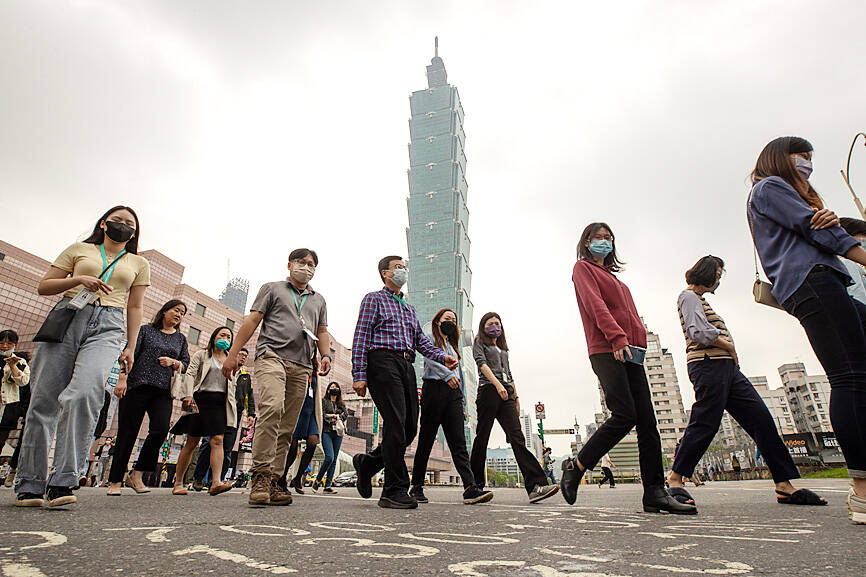Fixed investment in Taiwan passed NT$6 trillion (US$196.54 billion) for the first time last year, up more than 6 percent from a year earlier, with semiconductor suppliers planning to expand production and upgrade technologies, and as many firms join the rush to invest in 5G applications, the Ministry of Economic Affairs said in a report on Wednesday last week.
The increase reflected moves by Taiwanese firms with overseas operations to invest in Taiwan amid escalating tensions between the US and China.
Fixed investments — referring to physical assets such as machinery, land, buildings, installations, vehicles and technologies — totaled NT$6.27 trillion last year, up 6.2 percent from a year earlier, adjusted for inflation, the report said.

Photo: Ritchie B. Tongo, EPA-EFE
From 2018 to last year, fixed investment in Taiwan grew at a compound annual growth rate of 8.2 percent, well beyond the 3.3 percent experienced from 2013 to 2017, the report said.
Fixed investments last year accounted for 27.6 percent of local GDP, up from 26.1 percent in 2021.
With investment in Taiwan on the rise, the ratio was at its highest since 1994, the report said.
Local fixed investments comprised 21.8 to 27.6 percent of national GDP from 2018 to last year, compared with 21.1 to 22.7 percent from 2013 to 2017, with the higher ratio over the past five years depicting fixed investment as a local economic growth driver, it said.
Semiconductor suppliers last year poured about US$36.3 billion into production equipment imports, up 13.1 percent from a year earlier, the report said.
That amount accounted for 48.3 percent of capital equipment imports, a record indicating that tech companies are looking to expand production and upgrade technology.
The ministry said the private sector serves as a major source of fixed investment in Taiwan.
Since 2014, private companies have accounted for more than 80 percent of Taiwan’s fixed investments, it said.
From 2021 to last year, the private sector accounted for 84.6 percent of total investment in the wake of an investment surge by the semiconductor industry, while the public sector accounted for just 15.4 percent last year, the ministry said.
Enterprises in Taiwan could scale back their investments this year amid global economic uncertainty, it said.

Hon Hai Precision Industry Co (鴻海精密) yesterday said that its research institute has launched its first advanced artificial intelligence (AI) large language model (LLM) using traditional Chinese, with technology assistance from Nvidia Corp. Hon Hai, also known as Foxconn Technology Group (富士康科技集團), said the LLM, FoxBrain, is expected to improve its data analysis capabilities for smart manufacturing, and electric vehicle and smart city development. An LLM is a type of AI trained on vast amounts of text data and uses deep learning techniques, particularly neural networks, to process and generate language. They are essential for building and improving AI-powered servers. Nvidia provided assistance

GREAT SUCCESS: Republican Senator Todd Young expressed surprise at Trump’s comments and said he expects the administration to keep the program running US lawmakers who helped secure billions of dollars in subsidies for domestic semiconductor manufacturing rejected US President Donald Trump’s call to revoke the 2022 CHIPS and Science Act, signaling that any repeal effort in the US Congress would fall short. US Senate Minority Leader Chuck Schumer, who negotiated the law, on Wednesday said that Trump’s demand would fail, while a top Republican proponent, US Senator Todd Young, expressed surprise at the president’s comments and said he expects the administration to keep the program running. The CHIPS Act is “essential for America leading the world in tech, leading the world in AI [artificial

DOMESTIC SUPPLY: The probe comes as Donald Trump has called for the repeal of the US$52.7 billion CHIPS and Science Act, which the US Congress passed in 2022 The Office of the US Trade Representative is to hold a hearing tomorrow into older Chinese-made “legacy” semiconductors that could heap more US tariffs on chips from China that power everyday goods from cars to washing machines to telecoms equipment. The probe, which began during former US president Joe Biden’s tenure in December last year, aims to protect US and other semiconductor producers from China’s massive state-driven buildup of domestic chip supply. A 50 percent US tariff on Chinese semiconductors began on Jan. 1. Legacy chips use older manufacturing processes introduced more than a decade ago and are often far simpler than

Gasoline and diesel prices this week are to decrease NT$0.5 and NT$1 per liter respectively as international crude prices continued to fall last week, CPC Corp, Taiwan (CPC, 台灣中油) and Formosa Petrochemical Corp (台塑石化) said yesterday. Effective today, gasoline prices at CPC and Formosa stations are to decrease to NT$29.2, NT$30.7 and NT$32.7 per liter for 92, 95 and 98-octane unleaded gasoline respectively, while premium diesel is to cost NT$27.9 per liter at CPC stations and NT$27.7 at Formosa pumps, the companies said in separate statements. Global crude oil prices dropped last week after the eight OPEC+ members said they would